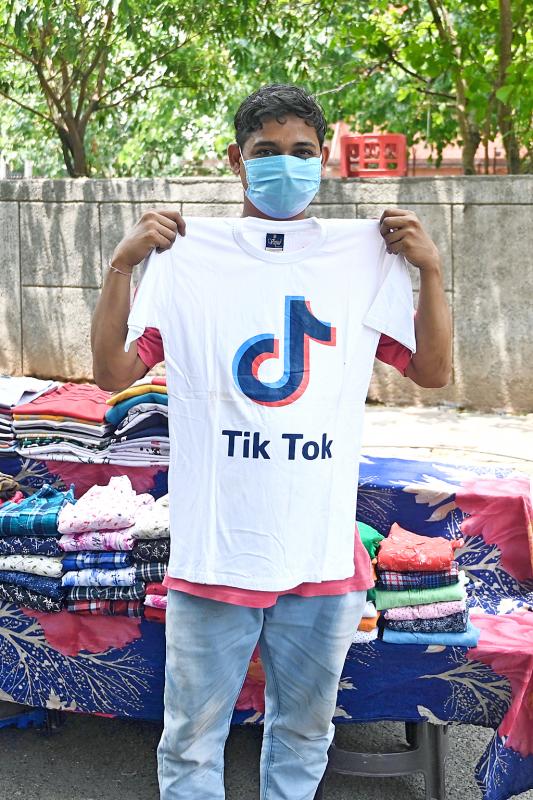India on Monday banned ByteDance’s (字節跳動) viral short-video service TikTok and 58 other Chinese apps, citing threats to its sovereignty and security as relations between the world’s two largest populations worsened.
The unprecedented moratorium — announced after border tensions in the Himalayas on June 15 left 20 Indian soldiers dead — deals a blow to the most prominent names in Chinese technology.
The banned services included e-commerce giant Alibaba Group Holding Ltd’s (阿里巴巴) UC Web, social media leader Tencent Holdings Ltd’s (騰訊) WeChat and Baidu Inc’s (百度) map and translation platforms.

Photo: AFP
The move marks another attempt by India to reduce dependence on its neighbor’s products and hampers efforts by China’s largest corporations to expand beyond their own borders — a collective endeavor encapsulated by TikTok’s phenomenal success abroad and particularly in India, ByteDance’s largest international market.
The world’s most valuable startup responded by saying it would meet with Indian Prime Minister Narendra Modi’s government to discuss the matter.
“TikTok continues to comply with all data privacy and security requirements under Indian law and has not shared any information of our users in India with any foreign government, including the Chinese government,” Nikhil Gandhi, the company’s local boss, wrote on its Twitter account. “Further if we are requested to in the future we would not do so.”
In an e-mailed statement, TikTok also said that its “team of around 2,000 employees in India is committed to working with the government to demonstrate our dedication to user security and our commitment to the country overall.”
The ban also includes smartphone maker Xiaomi Corp’s (小米) Mi Video Call and Sina Weibo (微博).
The unauthorized transmission and storage of Indian users’ data in overseas servers and “its mining and profiling by elements hostile to national security and defense of India” is a matter of deep and immediate concern requiring the emergency measures, the Indian Ministry of Electronics and Information Technology said in a statement on Monday.
Representatives for Alibaba, Tencent and Baidu did not have immediate comment when contacted.
“China is strongly concerned about the relevant notice issued by the Indian side. We are checking on and verifying the situation,” Ministry of Foreign Affairs spokesman Zhao Lijian (趙立堅) told reporters yesterday at a briefing in Beijing. “The Chinese government always asks Chinese businesses to abide by international rules and local laws and regulations in their business cooperation with foreign countries.”
It is not clear how the ban would be implemented, as most of these apps are already installed on users’ cellphones. The government might block the apps’ servers and prevent new users from downloading them.

The CIA has a message for Chinese government officials worried about their place in Chinese President Xi Jinping’s (習近平) government: Come work with us. The agency released two Mandarin-language videos on social media on Thursday inviting disgruntled officials to contact the CIA. The recruitment videos posted on YouTube and X racked up more than 5 million views combined in their first day. The outreach comes as CIA Director John Ratcliffe has vowed to boost the agency’s use of intelligence from human sources and its focus on China, which has recently targeted US officials with its own espionage operations. The videos are “aimed at

STEADFAST FRIEND: The bills encourage increased Taiwan-US engagement and address China’s distortion of UN Resolution 2758 to isolate Taiwan internationally The Presidential Office yesterday thanked the US House of Representatives for unanimously passing two Taiwan-related bills highlighting its solid support for Taiwan’s democracy and global participation, and for deepening bilateral relations. One of the bills, the Taiwan Assurance Implementation Act, requires the US Department of State to periodically review its guidelines for engagement with Taiwan, and report to the US Congress on the guidelines and plans to lift self-imposed limitations on US-Taiwan engagement. The other bill is the Taiwan International Solidarity Act, which clarifies that UN Resolution 2758 does not address the issue of the representation of Taiwan or its people in

US Indo-Pacific Commander Admiral Samuel Paparo on Friday expressed concern over the rate at which China is diversifying its military exercises, the Financial Times (FT) reported on Saturday. “The rates of change on the depth and breadth of their exercises is the one non-linear effect that I’ve seen in the last year that wakes me up at night or keeps me up at night,” Paparo was quoted by FT as saying while attending the annual Sedona Forum at the McCain Institute in Arizona. Paparo also expressed concern over the speed with which China was expanding its military. While the US

SHIFT: Taiwan’s better-than-expected first-quarter GDP and signs of weakness in the US have driven global capital back to emerging markets, the central bank head said The central bank yesterday blamed market speculation for the steep rise in the local currency, and urged exporters and financial institutions to stay calm and stop panic sell-offs to avoid hurting their own profitability. The nation’s top monetary policymaker said that it would step in, if necessary, to maintain order and stability in the foreign exchange market. The remarks came as the NT dollar yesterday closed up NT$0.919 to NT$30.145 against the US dollar in Taipei trading, after rising as high as NT$29.59 in intraday trading. The local currency has surged 5.85 percent against the greenback over the past two sessions, central